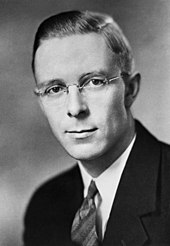Ernest Manning
Ernest Charles Manning , PC , CC , AOE (born September 20, 1908 in Carnduff , Saskatchewan , † February 19, 1996 in Calgary ) was a Canadian politician and preacher . From May 31, 1943 to December 12, 1968 he was Prime Minister of the Province of Alberta and Chairman of the Social Credit Party of Alberta . His tenure of more than 25 years is the longest of any head of government in this province and the second longest of any Canadian provincial prime minister (after George Henry Murray of Nova Scotia ). Under his leadership, Alberta developed into one of the most prosperous provinces in the country. From 1970 to 1983 he represented the Social Credit Party of Canada in the Senate .
Private life and provincial politics
Manning grew up on a farm in southeast Saskatchewan. During his youth he became more and more interested in the evangelical radio broadcasts of the Baptist preacher William Aberhart , which were broadcast throughout Western Canada from 1925 . In 1927 he enrolled in Aberhart's Calgary Prophetic Bible Institute and was the first graduate from that institution. From 1930 onwards he hosted religious radio broadcasts himself on Sundays, which were eventually distributed throughout Canada and found a large audience. He continued this job well into old age, even when he was involved in politics.
Aberhart founded the Social Credit Party of Alberta in 1935 after the ruling United Farmers of Alberta were unwilling to include the theories of Social Credit in their party program. In the Alberta Legislative Assembly elections in August 1935, the Socreds won a completely unexpected landslide victory with more than half the vote. Manning was elected in the Calgary constituency and Aberhart, who had now become the provincial prime minister, appointed him deputy and minister for industry and trade.
In 1936 Manning married the pianist Muriel Aileen Preston. Together they had two sons, Keith and Preston . The latter later also became a prominent politician. Preston Manning was a member of the House of Commons and chairman of the Reform Party of Canada , one of the forerunners of today's Conservative Party of Canada .
After the outbreak of World War II , Manning volunteered in the reserves of the Canadian Army and received the rank of lieutenant. In 1943 he was promoted to captain. After 1940 he represented the Edmonton constituency in the provincial parliament .
prime minister
On May 23, 1943, William Aberhart died unexpectedly while visiting Vancouver, and the Social Credit Party delegates elected Ernest Manning as the new party leader. On May 31, he was named Prime Minister by Lieutenant Governor John Bowen . Manning was not only head of government, but also held various ministerial posts: Treasurer (1944–1954), Minister of Mines and Natural Resources (1952–1962) and Attorney General (1955–1968). From 1959 he represented the constituency of Strathcona East in the legislative assembly.
The government followed a more pragmatic course than under Aberhart: It gave up the social credit theories because they could not be implemented at the provincial level alone. The Social Credit Party turned into one of the most conservative parties in Canada. Manning also tried to drive anti-Semitism , which had been an element of Christian populist rhetoric for years, out of the party. Various strict laws remained in place. For example, it was forbidden to serve alcohol on airplanes in the airspace of the province.
Under Manning, Alberta was almost a one-party state, with the Socreds getting more than 50% of the vote in seven consecutive elections and winning almost all seats. The reasons for this were the lack of political alternatives and, above all, the rapid economic development. In 1947, oil was first found near Leduc , whereupon Alberta quickly rose to become one of the country's most prosperous provinces. The tax revenues, which were many times higher despite a low tax rate, were invested in the expansion of the transport infrastructure, education and health care.
senator
Manning resigned in favor of Harry Strom on December 12, 1968, after serving over 25 years in office . Together with his son Preston, he founded a management consultancy called Manning Consultants Limited . He also served on the boards of various large companies. In 1970 he was appointed to the Senate of Canada . As it turned out later, he was the only Senator from the Social Credit Party of Canada . In the same year he received the Order of Canada . Manning was a member of the Senate for the most part on the Finance Commission, but at times also on the Science Commission. In 1980 he set up a foundation that has been giving the Manning Innovation Awards since 1982 to Canadians who have distinguished themselves through innovative achievements. In 1983 Manning had to resign as senator because he had reached the age limit of 75 years.
Web links
- Ernest Manning ( English, French ) In: The Canadian Encyclopedia .
- Biography on the Alberta Legislative Assembly website
- Ernest Manning - biographical information on the website of the Canadian Parliament (English)
- Manning Innovation Awards
| personal data | |
|---|---|
| SURNAME | Manning, Ernest |
| ALTERNATIVE NAMES | Manning, Ernest Charles (full name) |
| BRIEF DESCRIPTION | Canadian politician |
| DATE OF BIRTH | September 20, 1908 |
| PLACE OF BIRTH | Carnduff , Saskatchewan |
| DATE OF DEATH | February 19, 1996 |
| Place of death | Calgary |
